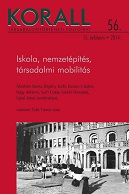Városiasodás és önszerveződés. Egyesületek Kassán a 19. század második felében
Urbanisation and Self-Organisation. Civic Societies in Košice in the Second Half of the Nineteenth Century
Author(s): Tamás CsíkiSubject(s): History
Published by: KORALL Társadalomtörténeti Egyesület
Summary/Abstract: The study examines the history of civic societies in Kassa (present-day Košice, Slovakia), which were important elements of the urbanisation process of the town, and attest to the diversity of local communities. In terms of the sociological interpretation of behaviour, the town’s self-organised societies reflect the segregation of Estates across urban communities: the Nagy Kaszinó (Great Casino), founded in the Hungarian Reform-Era of the 1830s, quickly became the exclusive club of middle class elites, the Polgári Társaskör (Civil Social Club) followed the social patterns of the lives of merchants and tradesmen, while the Kassai Kaszinó attracted its membership primarily from county administrators and landed gentry. The Jewish-founded Kassai Társaskör (Kassa Social Club), as well as the Jewish participation in the Nagy Kaszinó, suggest that religious affiliation and strategies of social integration co-existed in society memberships. In terms of history of ideas, Kosice’s cultural associations represent various contexts of culture, education and self-education. For example, choirs provided fora to express liberal, democratic or patriotic ideas alike, and Nemzeti Kör (National Club) was founded with a programme of radicalizing Hungarianisation as early as the 1880s. While members of self-education societies were able to acquire education within the framework of autonomous social life, Catholic associations, such as the Legényegylet (Young Men’s Association) and the association of village teachers, were striving to realise neo-Conservative ideas of sociability. Mutual societies, such as the funeral aid and self-help organisations which retained the traditions of trade guilds, illustrate how the corporative nature of the town’s erstwhile urban life remained a strong force in self-organisation as late as the Age of Dualism in the second half of the nineteenth century. At the same time, however, company health funds, whose operation was based on shared necessity, became the precursors of state-funded social security for workers.
Journal: Korall - Társadalomtörténeti folyóirat
- Issue Year: 2014
- Issue No: 56
- Page Range: 171-193
- Page Count: 23
- Language: Hungarian

